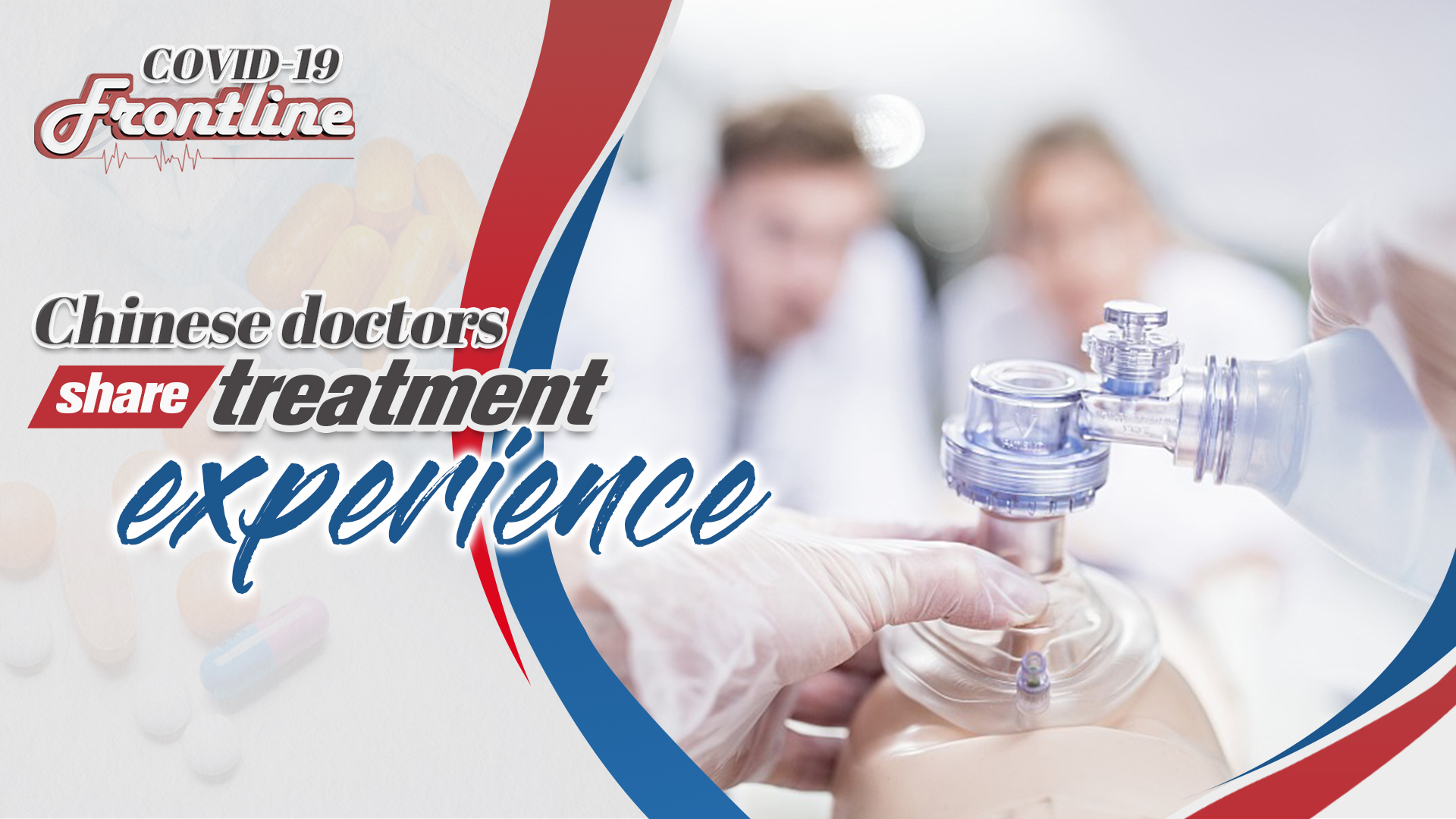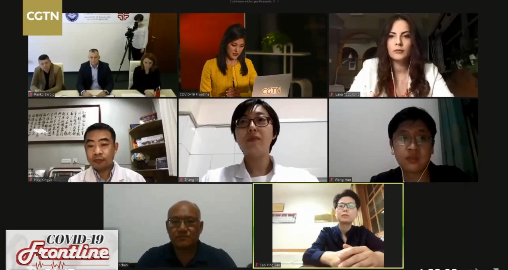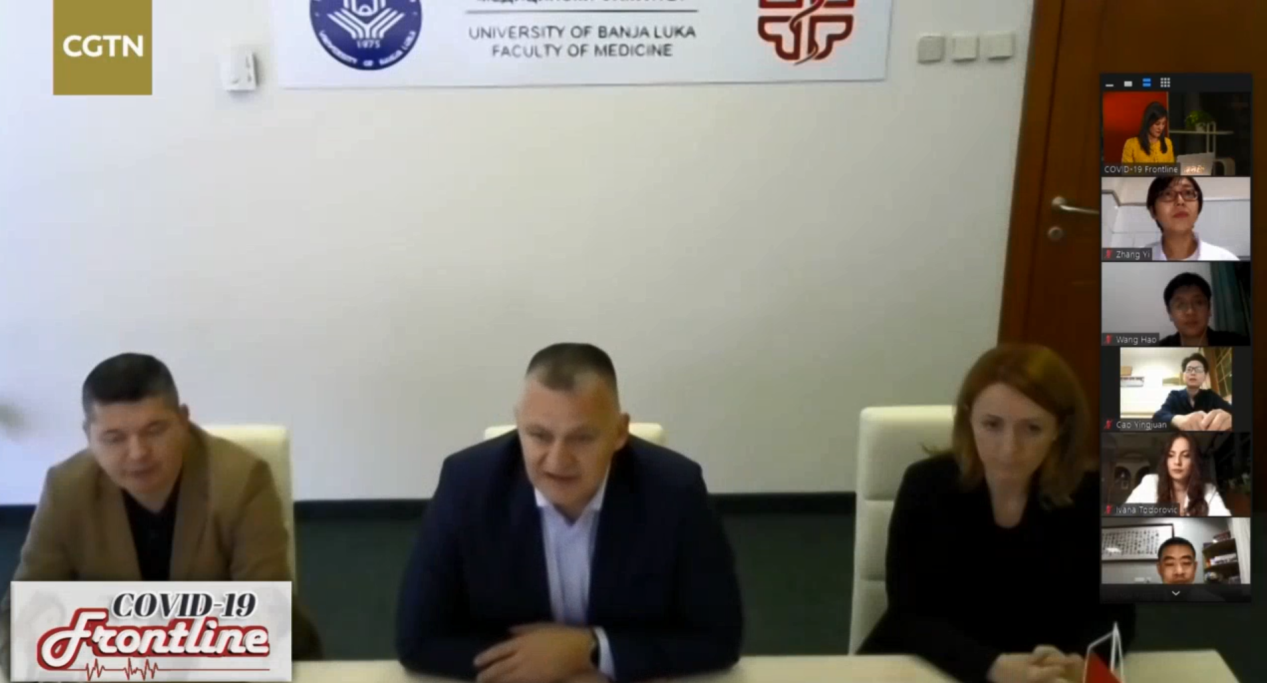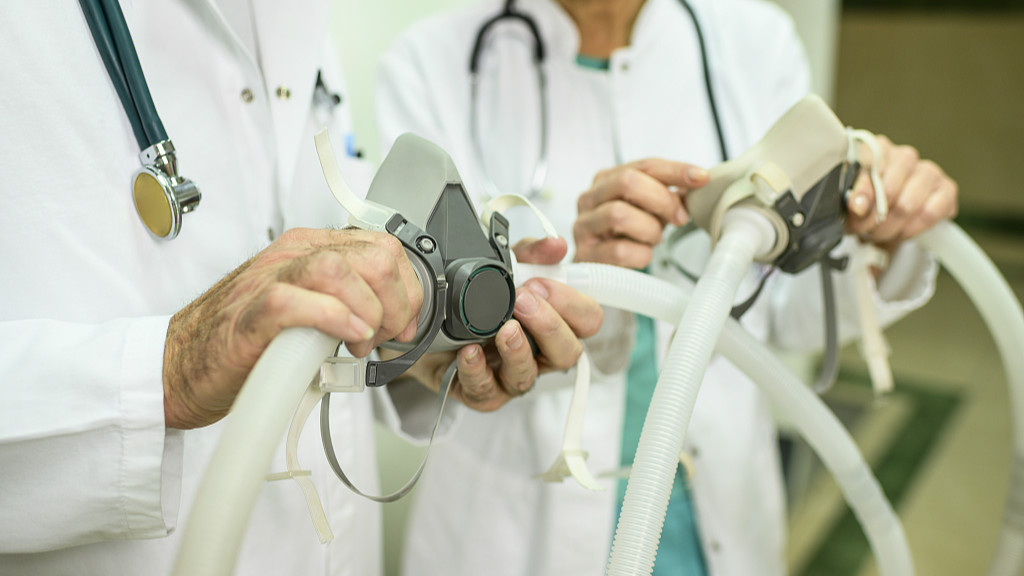Editor's note: According to the World Health Organization (WHO) data, as of May 26, there are more than 5.49 million confirmed COVID-19 cases and over 346,000 deaths across the world. On CGTN's live program "COVID-19 Frontline," medical workers and experts from China and the rest of the world share their experiences and take questions from social media, in the hope of providing more information for those battling against the pandemic.

As the COVID-19 pandemic continues across the globe, different therapies to treat the patients have been the most discussed topics among doctors and medical experts around the world.
On Monday's episode of "COVID-19 Frontline," doctors and experts from Qilu Hospital of Shandong University in east China talked with their counterparts from Bosnia and Herzegovina (BiH) in an online discussion to exchange their experience in treating COVID-19 patients.
Live: Chinese experts share COVID-19 working experience with BiH counterparts
After the epidemic broke out in China, the east China hospital sent to Wuhan a medical team of 131 doctors and nurses experienced in treating patients with severe and multiple complications.
As of May 26, BiH has reported 2,406 COVID-19 cases and 146 deaths.

Chinese doctors share experience with their counterparts from Bosnia and Herzegovina. /CGTN Screenshot
Chinese doctors share experience with their counterparts from Bosnia and Herzegovina. /CGTN Screenshot
Antiviral treatment
Ranko Škrbić, dean of the Department of Pharmacology at University of Banja Luka, asked about the most effective antiviral therapy that has been used in the Chinese hospital against the coronavirus.
Hou Xinguo, Deputy Director of Endocrinology Department at Qilu Hospital, said that several antiviral drugs including alpha-interferon, ribavirin and abidol have been recommended in the COVID-19 diagnosis and treatment guideline issued by China's health authorities. But based on their clinical experience, the antivirals could be useful on patients only at the early stage of infection, as they did not have significant effects on severely ill patients.
He added that according to the guideline, no more than two antiviral drugs should be used in combination.
Since there is no magic cure for the disease, the best strategy is to give the patients enough supportive care, including sufficient nutrition and efforts to control their underlying conditions such as hypertension and diabetes. Special attention should also be paid to the mental health of patients. All these efforts are aimed at helping patients improve their immunity to fight against the virus, which has helped reduce the mortality rate dramatically in China.

Doctors from Bosnia and Herzegovina (BiH) raise questions in a vido conference with their Chinese counterparts./CGTN Screenshot
Doctors from Bosnia and Herzegovina (BiH) raise questions in a vido conference with their Chinese counterparts./CGTN Screenshot
Are corticosteroids effective in treating COVID-19?
Milka Jandrić, head of the Department of Intensive Care for COVID-19 Patients at University Clinical Center of Republika Srpska, asked about the use of corticosteroids - a drug that lowers inflammation inside the body, in the treatment.
Zhang Yi, an associate professor at the Respiratory and Critical Care Medicine Department of Qilu Hospital, said they generally did not give corticosteroids to mild patients, but to severe patients, which works. The key indicator for it use is that a patient's oxygen saturation (SaO2) is below 39 percent, he said.
But he reminded that special attention should be paid to the drug's side effects, such as fungal infection. Meanwhile, doctors should watch for the patients' oxygenation index, CT imaging results and inflammatory reactions.
Wang Hao, an associate professor at ICU of Qilu Hospital, added that the World Health Organization has stated there's no evidence to prove the efficacy of corticosteroids. And based on his experience, the drug cannot reduce the risk of acute respiratory distress syndrome. However, he said, it can be used under two circumstances – when a patient suffers from severe cytokine storm and the condition deteriorates dramatically, and when a patient has severe acute respiratory distress syndrome accompanied with septic shock.
03:34

Tips for performing prone position ventilation
Peđa Kovačević, head of the Clinic for Intensive Care for Non-surgical Branches at University Clinical Center of Republika Srpska, asked about performing prone position ventilation for patients.
Cao Yingjuan, Deputy Director of the Nursing Department at Qilu Hospital, said that prone position ventilation has proved to be effective to improve the oxygenation of patients with severe acute respiratory distress syndrome and help to reduce the fatality rate.
To ensure the patients remain safe during the process, skin injuries and epidermal edema should be avoided when the patients are being disconnected with the ventilators. The medical staff should also watch out if patients have such symptoms as rapid decline of oxygenation index and asthma, she noted.
All the medics should wear proper personal protective equipment (PPE) during the whole process, against possible aerosol transmission of the virus.
How to use heparin – a blood thinner
Dr. Jandrić also asked about the use of heparin, which is an anticoagulant (blood thinner) that prevents the formation of blood clots. She wanted to know whether to give the patients preventive dose or therapeutic dose.
Preventive dose of a drug refers to the smallest amount that prevents the occurrence of symptoms, while therapeutic dose means the mount of medication required to treat a disease.
Dr. Wang Hao said they mainly treated severe and critically ill patients in Wuhan, who usually faced high risk of venous thromboembolism (VTE) – blood clots in the veins. So generally they gave most of the patients preventive dose of low molecular heparin for the prevention of VTE. But if the patients already had symptoms of VTE, they would give them therapeutic dose of heparin.
Dr. Zhang added that based on their observation, anticoagulation treatment with low molecular heparin is very important for severe COVID-19 patients.
In later episodes of "COVID-19 Frontline," more front-line doctors and experts from Wuhan will join in to share their experience with their colleagues from other parts of the world. If you have any questions regarding COVID-19, you can share with us using #MyOpinionOnCOVID19 on Facebook.
(Video edited by Zhang Rongyi
Cover image designed by Du Chenxin)